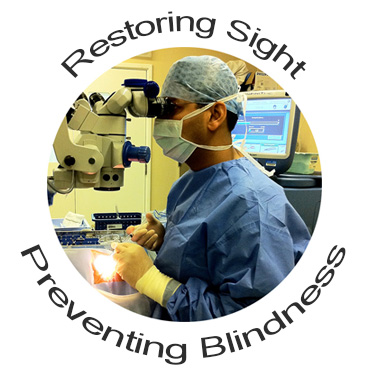Glaucoma is a chronic eye condition where the pressure within the eyeball increases, which results in damage being done to the optical nerve, causing loss of vision that can worsen over time if left untreated.
The increase in eye pressure happens when too much fluid is being produced in the eye. It can also happen when too little fluid can drain away from the eye, which is the most common cause of glaucoma.
The eye condition can go undetected for a while, but most people start to notice that the peripheral edges of their vision start to change. If left untreated, glaucoma can progress over time and cause permanent impairment to your vision, and will eventually lead to blindness.
Detecting glaucoma early
When you can have your glaucoma diagnosed early enough, the condition may be controlled through the use of eye drops and other medicines. However, around one in ten glaucoma patients in the UK (around 20,000 a year) will eventually need to have surgery to save their vision.
Dr Goyal is a Consultant Eye Surgeon in London based at St. Thomas’ Hospital, London. As a specialist in glaucoma treatment, he is at the cutting-edge of the latest research and developments in glaucoma treatments, including the use of laser technology and microsurgery.
Glaucoma is the commonest cause of vision loss in the world and currently, any damage done is irreversible. This is why you should never delay seeking out specialist help if you notice any worrying changes in your vision, especially if you have the common symptoms of glaucoma.
Glaucoma treatments options
While most people can have their glaucoma treated with medicated eye drops, surgery can be the best treatment to halt the progress of the disease. Surgery is usually in the form of laser or microsurgery that is used to make an opening in the iris to allow excess fluid in the eye to drain away, reducing the pressure within the eyeball.
While microsurgery is the most effective treatment for glaucoma, it may not be a permanent solution for all patients. Should the drainage channel become blocked, the pressure will start to build up again causing further sight loss, this is why it is very important to keep up your regular eye checks after surgery to make sure the condition doesn’t return.
Dr Goyal is working at the cutting-edge of new treatments for glaucoma, such as the development of a new therapy that may help to prevent the surgical drainage channel from sealing back up, potentially leading to a permanent surgical solution to regulate the fluid pressure within the eye.
Family history of glaucoma
It is especially important to have yourself checked for glaucoma if you have a family history of the condition. If you are over 40 years old with a first-degree relative with glaucoma, it will put your mind at ease to get yourself screened for glaucoma with your optician.
If you have never had a glaucoma test before, the procedure is quite painless and straightforward. Your examination will include testing your eye pressures, visual fields, gonioscopy, corneal thickness measurement, disc assessment and imaging. Your test results can be used to diagnose if you already have signs of glaucoma, or if not, they can be used as a baseline to compare with any future vision changes and test results.
Find out more about glaucoma and what symptoms to look out for, or if you have noticed any changes in your vision that you are concerned about, do not hesitate to contact the Eye Surgeon team for help.
